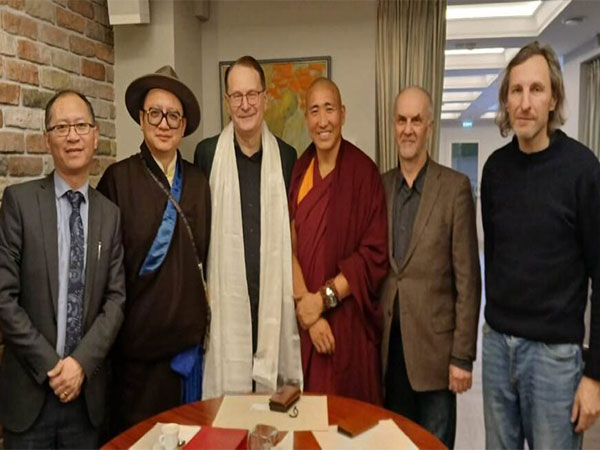Vilnius [Lithuania], November 12 (ANI): As part of their advocacy efforts to garner international support for Tibet’s autonomy, Tibetan parliamentarians Geshe Lharampa Gowo Lobsang Pende and Wangdue Dorjee launched a campaign in Vilnius, Lithuania, on November 11.
According to a press release from the Central Tibetan Administration, the campaign began with a meeting with Dainius Zalimas, a Member of the European Parliament and former President of the Constitutional Court of Lithuania. During the meeting, the MPs highlighted the Chinese government’s ongoing repression of Tibetan religious freedoms and the systematic Sinicisation of Tibetan Buddhism and culture.
Sinicisation is the process by which non-Chinese groups or societies are assimilated into Chinese culture. This includes the adoption of Chinese language, societal norms, culture, and ethnic identity.
They handed MEP Zalimas an official appeal letter signed by the Speaker of the Tibetan Parliament-in-Exile, urging him to advocate for the preservation of Tibet’s culture and autonomy.
The MPs extended an invitation to Zalimas to attend the upcoming World Parliamentarians’ Convention on Tibet (WPCT), stressing the necessity of sustained global support for Tibet’s cause. In response, MEP Zalimas reiterated his unwavering support for Tibet, despite the challenges posed by the current political climate.
The Tibetan delegation included Kunga, Secretary of the Office of Tibet in London, and was joined by prominent Lithuanian supporters of Tibet, Professor Vytis Vidunas and Robertas Mazeika.
Tibet’s struggle for autonomy remains a complex issue that intertwines political, cultural, and human rights concerns in a region celebrated for its rich spiritual and cultural heritage. Since China invaded Tibet in 1950 and its subsequent incorporation into the People’s Republic of China, the region has faced sweeping changes in governance and society. Tibetan leaders, including the Dalai Lama, have consistently called for greater autonomy, citing threats of cultural erosion, religious restrictions, and human rights violations.
Meanwhile, Beijing insists that Tibet is an integral part of China, justifying its policies as measures to foster economic growth and modernisation. This divergence in narratives continues to spark global debate and activism, with Tibet remaining a central issue in international human rights and diplomatic discussions. (ANI)
Disclaimer: This story is auto-generated from a syndicated feed of ANI; only the image & headline may have been reworked by News Services Division of World News Network Inc Ltd and Palghar News and Pune News and World News
HINDI, MARATHI, GUJARATI, TAMIL, TELUGU, BENGALI, KANNADA, ORIYA, PUNJABI, URDU, MALAYALAM
For more details and packages











